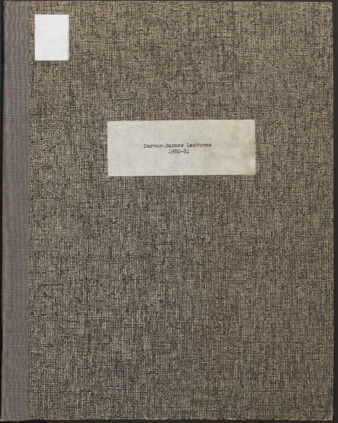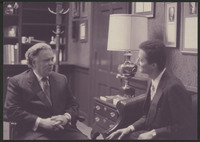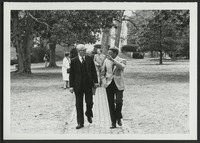Search Constraints
« Previous |
4,851 - 4,860 of 5,071
|
Next »
Search Results

- Description:
- Delivered by Walter B. Shurden, Dean, School of Theology, Southern Baptist Theological Seminary, November 4-5, 1980 at Southeastern Baptist Theological Seminary, Wake Forest, NC
- Subject:
- Southeastern Baptist Theological Seminary and Southern Baptist Convention
- Creator:
- Southeastern Baptist Theological Seminary and Shurden, Walter B.
- Location:
- Southeastern Baptist Theological Seminary, Wake County (N.C.), and Wake Forest (N.C.)
- Language:
- English
- Date Created:
- November 4, 1980
- Resource type:
- Text
- Identifier:
- BT80.C38 1980-81

- Description:
- CDI-01-5026: President Dr. Paige Patterson with Timothy Abraham, Spring 1993; CDI-01-5027: Spring 1993; CDI-01-5028: October 13, 1992; CDI-01-5034: October 13, 1992; CDI-01-5035: October 13, 1992; CDI-01-5029: October 13, 1992, Patterson Inauguration; CDI-01-5031: October 13, 1992, Patterson Inauguration; CDI-01-5032: "Dr. Paige Patterson frequently addresses Southeastern students."; CDI-01-5033: October, 1992; CDI-01-5036: Dr. Lewis Drummond inauguration, 1998
- Subject:
- Patterson, Paige, Theological seminary presidents, Drummond, Lewis A., and Southeastern Baptist Theological Seminary
- Creator:
- Southeastern Baptist Theological Seminary
- Location:
- Wake Forest (N.C.)
- Language:
- English
- Date Created:
- 1988 to 2003
- Resource type:
- Graphic Materials
- Identifier:
- CDI-01-5026/5044

- Description:
- CDI-01-4605: Ray Rust of the South Carolina Baptist Convention and on the right Dr. Randall Lolley, March 1982; CDI-01-4606: Ray Rust of the South Carolina Baptist Convention and on the right Dr. Randall Lolley, March 1982; CDI-01-4607: Trustee Gene Curtis, 1982; CDI-01-4608: Missionaries, 1983; CDI-01-4609: R. Kirby Godsey, president of Mercer University, October 1983; CDI-01-4610: Trustee Billy Cline, 1982; CDI-01-4611: "New trustees on campus for orientation: Robert Shirley of Mississippi, Dr. Randall Lolley, Warren Pearson of New Mexico, David French of Michigan, trustee chairman Sam Alden, and James Deloach of Texas."; CDI-01-4612: October 1981; CDI-01-4613: "Executive Council August 1981, From left to right: Jerry Niswonger, Gene McLeod, Paul Fletcher, Rod Byard, Bob Spinks, Dean Morris Ashcraft, and President Randall Lolley."; CDI-01-4614: Arthur Walker, September 1981; CDI-01-4615: Jack Reynolds with Joe Ingram of Oklahoma, 1981; CDI-01-4616: "Leon Pacala, Executive Director, Association of Theological Schools, spoke to the Trustees, faculty and administration, during the Board's March meeting., 1981"
- Subject:
- Lolley, W. Randall (William Randall), 1931-, Theological seminary trustees, Theological seminary presidents, and Southeastern Baptist Theological Seminary
- Creator:
- Southeastern Baptist Theological Seminary
- Location:
- Wake Forest (N.C.)
- Language:
- English
- Date Created:
- 1981 to 1983
- Resource type:
- Graphic Materials
- Identifier:
- CDI-01-4605/4616

- Description:
- The inauguration of W. Randall Lolley as the third President of SEBTS. This recording features the entirety of the inauguration ceremony from the Prelude to the Recessional. President Lolley spoke on the raging currents of life that Southeastern must march towards and against in his Inaugural Address titled, "Quo Vadis, Southeastern?" from 57:55-1:26:41.
Dr. Olin Trivette Binkley gives the Invocation from 7:51-9:20. Mr. Roscoe Lolley gives the inaugural prayer from 44:28-46:46. Mr. Carl A. Hudson gives the Installation of the President from 47:01-57:31. Dr. Cecil A. Ray closes with the Benediction from 1:30:43-1:33:05.
The opening music is titled "Prelude and Fugue in C Major" from 0:00-7:48. "O God of Our Fathers" plays from 9:25-11:55. "Almighty God of Our Fathers" plays from 40:25-44:15. "The Seminary Hymn" plays from 1:27:15-1:30:40. "Allegro Maestoso" and "Toccata" close out the audio recording from 1:33:07-1:39:41.
A bulletin for this ceremony is located via the "Related URL" field below.
- Creator:
- Binkley, Olin Trivette, 1908-1999, Ray, Cecil A., Lolley, Roscoe, Lawrence, Lana, McClellan, Albert, Naylor, Robert E., Lolley, W. Randall (William Randall), 1931-, Southeastern Baptist Theological Seminary, and Hudson, Carl A.
- Location:
- Wake Forest (N.C.)
- Language:
- English
- Date Created:
- March 11, 1976
- Resource type:
- Audio
- Identifier:
- SEBTS_Lolley_Inauguration_1976-03-11

- Description:
- A recording of the luncheon from the inauguration of William Randall Lolley. This luncheon was a smaller gathering of friends and faculty following the ceremony that inaugurated Dr. W. Randall Lolley as the third President of SEBTS. Dr. Charles Granger provided the Invocation from 0:40-1:30. Dr. John William Eddins opened with a greeting and acknowledgements from 1:38-7:05. The main address was given by Dr. Lois V. Edinger who gave a speech on the importance of Religion and Education from 9:30-42:32. President Lolley expressed his gratitude for everyone from 42:45-43:19. Mr. Tom E. Lolley closed with the Benediction from 43:25-44:33.
- Subject:
- Religion and Education
- Creator:
- Granger, Charles, Edinger, Lois V., Lolley, Tom E., Eddins, John William, and Southeastern Baptist Theological Seminary
- Location:
- Wake Forest (N.C.)
- Language:
- English
- Date Created:
- March 11, 1976
- Resource type:
- Audio
- Identifier:
- SEBTS_Lolley_Inauguration_Luncheon_1976-03-11

- Description:
- Dr. Helmut Richard Niebuhr, a Christian theologian, Professor at Yale Divinity School, and author of Christ and Culture, speaks mainly on Protestantism as it relates to politics and culture. He spends most of this lecture comparing Protestantism to Democracy and sharing how they are so interconnected that they can at times become syncretistic.
- Keyword:
- Protestantism
- Subject:
- Democracy, Christianity and culture, Christianity and politics, and Protestantism
- Creator:
- Niebuhr, H. Richard (Helmut Richard), 1894-1962 and Southeastern Baptist Theological Seminary
- Location:
- Wake Forest (N.C.)
- Language:
- English
- Date Created:
- January 22, 1958
- Resource type:
- Audio
- Identifier:
- SEBTS_Event_Helmut_Richard_Niebuhr_1958-01-22

- Description:
- The service opens with the reading of an excerpt from the poem “The Marshes of Glynn” by Sidney Lanier (1842-1881), (00:00-00:32) the singing of hymn #263, (00:33-01:16) the mention of responsive reading of Selection 88 entitled “Victorious Assurance,” and an opening prayer (01:17-04:21). An introduction is given for William R. Steininger, the Chaplain of Dorothea Dix Hospital in Raleigh, NC for fifteen years, concerning his education, chaplaincy, and ministerial background (04:22-05:13). Steininger offers reading Romans 12 as an introduction to his message which is titled “The Greatest Journey” (05:14-07:07). In describing life as a journey, Steininger begins by saying our experiences are all similar yet unique, mostly ordinary yet sometimes special (07:08-17:24). He describes all of life as beginning with a question mark of discovery and ending with an exclamation point of finding what was searched for. He finishes his message by saying that the greatest thing we are searching for in this life is God, and He has been revealed in the person of Jesus Christ (17:25-22:14). He ends his time in prayer to God (22:15-23:02), and instrumental music ends the service (23:03-23:40).
- Subject:
- Christian life
- Creator:
- Steininger, William R. and Southeastern Baptist Theological Seminary
- Location:
- Wake Forest (N.C.)
- Language:
- English
- Date Created:
- October 27, 1965
- Resource type:
- Audio
- Identifier:
- SEBTS_Chapel_William_R_Steininger_1965-10-27

- Description:
- The service opens with prayer, (00:00-02:17) choral singing, (02:18-05:19) and responsive reading, Selection 84 (05:20-07:20). There is no introduction for William Claudius Strickland, but he was Professor of New Testament Interpretation. The Lord’s Supper is meditated upon, considering not only its practical implications but also its Scriptural meaning. Strickland walks through the passage from the texts of Matthew, Mark, and Luke. Strickland identifies three central insights from this passage (07:21-16:40). Firstly, the Lord’s Supper has to do with our present moment in genuine, living table fellowship. This was Paul’s emphasis in 1 Corinthians 11:17-34 (16:41-20:10). Secondly, the Lord’s Supper concerns our future, being celebrated with great joy and not becoming a social club (20:11-21:57). Thirdly, the Lord’s Supper concerns our past, which is the point we usually stress while missing its focus. Focusing on Christ’s death for our sins will result in a present assurance of hope and joy which the congregation will know without question is something that can only come from God (21:58-26:58). Strickland closes the service with prayer and the singing of one stanza of hymn 366 (26:59-27:59).
- Subject:
- Lord's Supper
- Creator:
- Strickland, William Claudius and Southeastern Baptist Theological Seminary
- Location:
- Wake Forest (N.C.)
- Language:
- English
- Date Created:
- October 28, 1965
- Resource type:
- Audio
- Identifier:
- SEBTS_Chapel_William_Claudius_Strickland_1965-10-28






